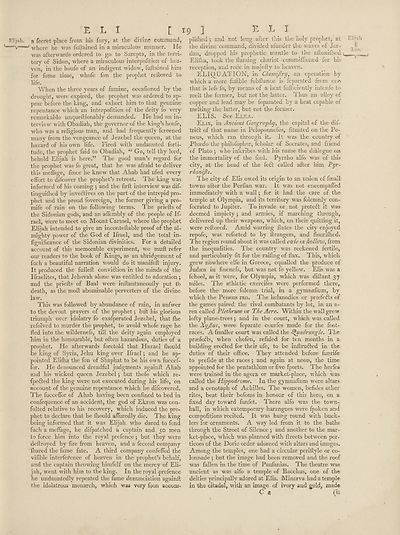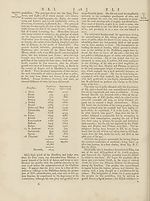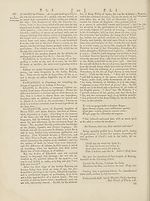Encyclopaedia Britannica, or, a Dictionary of arts, sciences, and miscellaneous literature : enlarged and improved. Illustrated with nearly six hundred engravings > Volume 8, ELE-FOR
(31) Page 19
Download files
Complete book:
Individual page:
Thumbnail gallery: Grid view | List view

ELI [ 19 ] ELI
Elijah, a fecret place from his fury, at the divine command,
—v" ' where he was fuftained in a miraculous manner. He
was afterwards ordered to go to Sarepta, in the terri¬
tory of Sidon, where a miraculous interpofition of hea¬
ven, in the houfe of an indigent widow, fuilained him
for fome time, whofe fon the prophet reftored to
life.
When the three years of famine, occalloned by the
drought, were expired, the prophet was ordered to ap¬
pear before the king, and exhort him to that genuine
repentance which an interpofition of the deity fo very
remarkable unqueftionably demanded. He had an in¬
terview with Obadiah, the governor of the king’s houfe,
who was a religious man, and had frequently fcreened
many from the vengeance of Jezebel the queen, at the
hazard of bis own life. Fired with undaunted forti¬
tude, the prophet faid to Obadiah, “ Go, tell thy lord,
behold Elijah is here.” The good man’s regard for
the prophet was fo great, that he was afraid to deliver
this meffage, fmce he knew that Ahab had ufed every
effort to difcover the prophet’s retreat. The king was
informed of his coming ; and the firft interview was dif-
tinguifhed by invectives on the part of the intrepid pro¬
phet and the proud fovereign, the former giving a pro-
mife of rain on the following terms. The priefts of
the Sidonian gods, and an afl’embly of the people of If-
rael, were to meet on Mount Carmel, where the prophet
Elijah intended to give an inconteftable proof of the al¬
mighty power of the God of Ifrael, and the total in-
fignificance of the Sidonian divinities. For a detailed
account of this memorable experiment, we muff refer
our readers to the book of Kings, as an abridgement of
fueh a beautiful narration would do it manifefi: injury.
It produced the fulleft conviction in the minds of the
Ifraelites, that Jehovah alone was entitled to adoration 5
and the priefts of Baal were inftantaneoufly put to
death, as the moll abominable perverters of the divine
law.
This was followed by abundance of rain, in anfwer
to the devout prayers of the prophet 5 but his glorious
triumph over idolatry fo exafperated Jezebel, that fhe
refolved to murder the prophet, to avoid whofe rage he
fled into the wildernefs, till the deity again employed
him in the honourable, but often hazardous, duties of a
prophet. He afterwards foretold that Hazael (hould
be king of Syria, Jehu king over Ifrael •, and he ap¬
pointed Eliflia the fon of Shaphat to be his own fuccef-
ior. He denounced dreadful judgments againfl: Ahab
and his wicked queen Jezebel; but thofe which re-
fpefled the king were not executed during his life, on
account of the genuine repentance which he difeovered.
The fucceflbr of Ahab having been confined to bed in
confequence of an accident, the god of Ekron was con-
fulted relative to his recovery, which induced the pro¬
phet to declare that he {hould afluredly die. The king
being informed that it was Elijah who dared to fend
fuch a meffage, he difpatched a captain and 50 men
to force him into the royal prefence j but they were
deftroyed by fire from heaven, and a fecond company
{hared the fame fate. A third company confeffed the
vifible interference of heaven in the prophet’s behalf,
and the captain throwing himfelf on the mercy of Eli¬
jah, went with him to the king. In the royal prefence
he undauntedly repeated the fame denunciation againft
the idolatrous monarch, which was very foon accom-
p]ilhed ; and not long after this the holy prophet, at
the divine command, divided afunder the waves of Jor¬
dan, dropped his prophetic mantle to the aftonifhed
Elifha, took the darning chariot commiffioned for his
reception, and rode in majefty to heaven.
EL I (JU ATI ON, in ChemiJIry, an operation by
which a more fufible fubftance is feparated from one
that is lefs fo, by means of a heat fufticiently intenfe to
melt the former, but not the latter. Thus an alloy of
copper and lead may be feparated by a heat capable of
melting the latter, but not the former.
ELIS. See Elea.
Elis, in Ancient Geography, the capital of the dii
tridt of that name in Peloponnefus, fituated on the Pe-
neus, which ran through it. It was the country of
Phsedo the philofopher, fcholar of Socrates, and friend
of Plato 5 who inferibes with his name the dialogue 011
the immortality of the foul. Pyrrho alfo was of this
city, at the head of the feel called after him Pyr-
rhonijls.
The city of Elis owed its origin to an union of fmali
towns after the Perfian war. It was not encompaffed
immediately with a wall; for it had the care of the
temple at Olympia, and its territory was folemnly con-
fecrated to Jupiter. To invade or not proteft it was
deemed impiety, and armies, if marching through,
delivered up their weapons, which, on their quitting it,
were reftored. Amid warring ftates the city enjoyed
repofe, was reforted to by ftrangers, and flouriftiedt
The region round about it wras called ccele or hollow, from
the inequalities. The country was reckoned fertile,
and particularly fit for the raifing of flax. This, which
grew nowhere elfe in Greece, equalled the produce of
Judaea in finenefs, but was not fo yellow. Elis was a
fchool, as it were, for Olympia, which was diftant 37
miles. The athletic exercifes were performed there,
before the more folemn trial, in a gymnafium, by
which the Peneus ran. The helanodics or praefedls of
the games paired the rival combatants by lot, in an a-
rea called Plethrum or The Acre. Within the wall grew
lofty plane-trees; and in the court, which was called
the Xyjlus, wrere feparate courfes made for the foot¬
races. A fmaller court was called the Quadrangle. The
praefedls, when cholen, refided for ten months in a
building eredled for their ufe, to be inftrufted in the
duties of their office. They attended before funrife
to prefide at the races ; and again at noon, the time
appointed for the pentathlum or five fports. The horfes
were trained in the agora or market-place, which was
called the Hippodrome. In the gymnafium were altars
and a cenotaph of Achilles. The women, befides other
rites, beat their bofoms in honour of this hero, on a
fixed day toward funfet. There alfo was the town-
hall, in which extemporary harangues were fpoken and
compofitions recited. It was hung round with buck¬
lers for ornaments. A way led from it to the baths
through the Street of Silence ; and another to the mar¬
ket-place, which Avas planned with ftreets between por¬
ticoes of the Doric order adorned with altars and images.
Among the temples, one had a circular periftyle or co¬
lonnade $ but the image had been removed and the roof
Avas fallen in the time of Paufanias. The theatre Avas
ancient as was alfo a temple of Bacchus, one of the
deities principally adored at Elis. Minerva had a temple
in the citadel, with an image of ivory and gold, made
C ® (it
EifiaH
li
Ins.
Elijah, a fecret place from his fury, at the divine command,
—v" ' where he was fuftained in a miraculous manner. He
was afterwards ordered to go to Sarepta, in the terri¬
tory of Sidon, where a miraculous interpofition of hea¬
ven, in the houfe of an indigent widow, fuilained him
for fome time, whofe fon the prophet reftored to
life.
When the three years of famine, occalloned by the
drought, were expired, the prophet was ordered to ap¬
pear before the king, and exhort him to that genuine
repentance which an interpofition of the deity fo very
remarkable unqueftionably demanded. He had an in¬
terview with Obadiah, the governor of the king’s houfe,
who was a religious man, and had frequently fcreened
many from the vengeance of Jezebel the queen, at the
hazard of bis own life. Fired with undaunted forti¬
tude, the prophet faid to Obadiah, “ Go, tell thy lord,
behold Elijah is here.” The good man’s regard for
the prophet was fo great, that he was afraid to deliver
this meffage, fmce he knew that Ahab had ufed every
effort to difcover the prophet’s retreat. The king was
informed of his coming ; and the firft interview was dif-
tinguifhed by invectives on the part of the intrepid pro¬
phet and the proud fovereign, the former giving a pro-
mife of rain on the following terms. The priefts of
the Sidonian gods, and an afl’embly of the people of If-
rael, were to meet on Mount Carmel, where the prophet
Elijah intended to give an inconteftable proof of the al¬
mighty power of the God of Ifrael, and the total in-
fignificance of the Sidonian divinities. For a detailed
account of this memorable experiment, we muff refer
our readers to the book of Kings, as an abridgement of
fueh a beautiful narration would do it manifefi: injury.
It produced the fulleft conviction in the minds of the
Ifraelites, that Jehovah alone was entitled to adoration 5
and the priefts of Baal were inftantaneoufly put to
death, as the moll abominable perverters of the divine
law.
This was followed by abundance of rain, in anfwer
to the devout prayers of the prophet 5 but his glorious
triumph over idolatry fo exafperated Jezebel, that fhe
refolved to murder the prophet, to avoid whofe rage he
fled into the wildernefs, till the deity again employed
him in the honourable, but often hazardous, duties of a
prophet. He afterwards foretold that Hazael (hould
be king of Syria, Jehu king over Ifrael •, and he ap¬
pointed Eliflia the fon of Shaphat to be his own fuccef-
ior. He denounced dreadful judgments againfl: Ahab
and his wicked queen Jezebel; but thofe which re-
fpefled the king were not executed during his life, on
account of the genuine repentance which he difeovered.
The fucceflbr of Ahab having been confined to bed in
confequence of an accident, the god of Ekron was con-
fulted relative to his recovery, which induced the pro¬
phet to declare that he {hould afluredly die. The king
being informed that it was Elijah who dared to fend
fuch a meffage, he difpatched a captain and 50 men
to force him into the royal prefence j but they were
deftroyed by fire from heaven, and a fecond company
{hared the fame fate. A third company confeffed the
vifible interference of heaven in the prophet’s behalf,
and the captain throwing himfelf on the mercy of Eli¬
jah, went with him to the king. In the royal prefence
he undauntedly repeated the fame denunciation againft
the idolatrous monarch, which was very foon accom-
p]ilhed ; and not long after this the holy prophet, at
the divine command, divided afunder the waves of Jor¬
dan, dropped his prophetic mantle to the aftonifhed
Elifha, took the darning chariot commiffioned for his
reception, and rode in majefty to heaven.
EL I (JU ATI ON, in ChemiJIry, an operation by
which a more fufible fubftance is feparated from one
that is lefs fo, by means of a heat fufticiently intenfe to
melt the former, but not the latter. Thus an alloy of
copper and lead may be feparated by a heat capable of
melting the latter, but not the former.
ELIS. See Elea.
Elis, in Ancient Geography, the capital of the dii
tridt of that name in Peloponnefus, fituated on the Pe-
neus, which ran through it. It was the country of
Phsedo the philofopher, fcholar of Socrates, and friend
of Plato 5 who inferibes with his name the dialogue 011
the immortality of the foul. Pyrrho alfo was of this
city, at the head of the feel called after him Pyr-
rhonijls.
The city of Elis owed its origin to an union of fmali
towns after the Perfian war. It was not encompaffed
immediately with a wall; for it had the care of the
temple at Olympia, and its territory was folemnly con-
fecrated to Jupiter. To invade or not proteft it was
deemed impiety, and armies, if marching through,
delivered up their weapons, which, on their quitting it,
were reftored. Amid warring ftates the city enjoyed
repofe, was reforted to by ftrangers, and flouriftiedt
The region round about it wras called ccele or hollow, from
the inequalities. The country was reckoned fertile,
and particularly fit for the raifing of flax. This, which
grew nowhere elfe in Greece, equalled the produce of
Judaea in finenefs, but was not fo yellow. Elis was a
fchool, as it were, for Olympia, which was diftant 37
miles. The athletic exercifes were performed there,
before the more folemn trial, in a gymnafium, by
which the Peneus ran. The helanodics or praefedls of
the games paired the rival combatants by lot, in an a-
rea called Plethrum or The Acre. Within the wall grew
lofty plane-trees; and in the court, which was called
the Xyjlus, wrere feparate courfes made for the foot¬
races. A fmaller court was called the Quadrangle. The
praefedls, when cholen, refided for ten months in a
building eredled for their ufe, to be inftrufted in the
duties of their office. They attended before funrife
to prefide at the races ; and again at noon, the time
appointed for the pentathlum or five fports. The horfes
were trained in the agora or market-place, which was
called the Hippodrome. In the gymnafium were altars
and a cenotaph of Achilles. The women, befides other
rites, beat their bofoms in honour of this hero, on a
fixed day toward funfet. There alfo was the town-
hall, in which extemporary harangues were fpoken and
compofitions recited. It was hung round with buck¬
lers for ornaments. A way led from it to the baths
through the Street of Silence ; and another to the mar¬
ket-place, which Avas planned with ftreets between por¬
ticoes of the Doric order adorned with altars and images.
Among the temples, one had a circular periftyle or co¬
lonnade $ but the image had been removed and the roof
Avas fallen in the time of Paufanias. The theatre Avas
ancient as was alfo a temple of Bacchus, one of the
deities principally adored at Elis. Minerva had a temple
in the citadel, with an image of ivory and gold, made
C ® (it
EifiaH
li
Ins.
Set display mode to:
![]() Universal Viewer |
Universal Viewer | ![]() Mirador |
Large image | Transcription
Mirador |
Large image | Transcription
Images and transcriptions on this page, including medium image downloads, may be used under the Creative Commons Attribution 4.0 International Licence unless otherwise stated. ![]()
| Permanent URL | https://digital.nls.uk/192263822 |
|---|
| Attribution and copyright: |
|
|---|
| Description | Ten editions of 'Encyclopaedia Britannica', issued from 1768-1903, in 231 volumes. Originally issued in 100 weekly parts (3 volumes) between 1768 and 1771 by publishers: Colin Macfarquhar and Andrew Bell (Edinburgh); editor: William Smellie: engraver: Andrew Bell. Expanded editions in the 19th century featured more volumes and contributions from leading experts in their fields. Managed and published in Edinburgh up to the 9th edition (25 volumes, from 1875-1889); the 10th edition (1902-1903) re-issued the 9th edition, with 11 supplementary volumes. |
|---|---|
| Additional NLS resources: |
|

